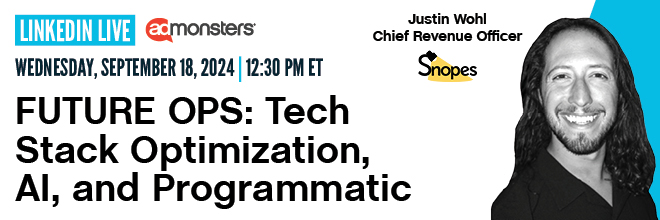 |
|||||||||||
|
|||||||||||
| Google Fights to Exclude Key Testimonies in Antitrust Trial |

Shutterstock
|
| The DOJ is coming hard at Google. With Big G's previous victory in the search antitrust trial, now they're aiming for another notch in their antitrust crusade. But everyone across ad tech wants to know how they will fare in this trial. In Google's second antitrust trial, the U.S. Department of Justice is challenging the tech behemoth's advertising practices, which prosecutors claim harms news publishers. The DOJ's latest move against Google follows a recent win in a separate case, where they found Google guilty of monopolizing online search. This upcoming trial focuses on Google's ad tech business, which connects publishers and advertisers and contributed over 75% of Google's $307.4 billion ad revenue last year. Ahead of the upcoming trial, Google attempted to exclude testimonies from key figures in the ad tech industry. The tech juggernaut argued that only economists or antitrust experts should testify, claiming that third-party competitors lack the expertise to determine if Google is a monopolist or if its practices harm competition. The DOJ countered that these witnesses, many of whom are Google competitors, are critical to the case. Judge Leonie Brinkema will decide whether to accept Google's argument and dismiss these testimonies. Google's ad exchange, AdX, is central to the dispute. - AB |
 |
| MediaMath is Back, But Can It Regain the Industry's Trust? |

Image sourced from ChatGPT, 4o, OpenAI, 7 Sept. 2024.
|
| When MediaMath filed for bankruptcy, everyone in the industry began to mourn its loss. Terence Kawaja, CEO of LUMA Partners, even created a graphic memorializing the DSP with a tombstone — my first glimpse of how dramatic ad tech could be. But after Infillion bought the beloved DSP, a resurrection was in order, just as Trey Titone, NBCUniversal's VP of Product Management, comically stated on X. But what will Infillion bring to the table with the new MediaMath? Infillion acquired the platform for $22 million in a bankruptcy auction to rebuild its infrastructure and reenter the market. After a heated bidding war and an ad tech resurrection for the ages, MediaMath will resume bidding. However, some in the ad tech space remain cautious, with one user commenting that the platform, while operational again, will remain blocked. Even Titone revealed some skepticism on X: Trey Titone @TreyTitone I'm not too familiar with the new ownership. I suppose the first order of business for any pub is to determine whether they can pay the bills and demonstrate stability. 11:16 AM · Sep 4, 2024 Despite MediaMath's relaunch, there is skepticism about the company's stability under new ownership. While Infillion sees untapped value in MediaMath's global ad tech footprint, others need proof that the new owners can pay their bills and maintain financial health. Others, including anonymous ad tech figure AdTechGod, are more optimistic, suggesting MediaMath is essentially a "new company" with fresh ownership and infrastructure. As MediaMath returns, it faces a crucial test in convincing publishers and buyers alike that it can offer value and security. - AB |
| Google’s Global Reckoning: CMA and DOJ Turn Up the Heat |
Regulators are closing in on Google, and the UK’s Competition and Markets Authority (CMA) just threw more fuel on the fire. Late last week, the CMA hit Google with a sharp objection, accusing the tech giant of using its ad tech dominance — tools like AdX and DoubleClick —to freeze out competitors. For publishers, this isn't a new song. They’ve been stuck in Google’s ecosystem for years with nowhere else to turn. While the CMA’s investigation is shaking up the UK’s open-display ad market, the U.S. DOJ is prepping for its own antitrust showdown. Two regulators, two cases, but the same core issue: Google’s chokehold on digital advertising is under fire from both sides of the Atlantic. This latest blow from the CMA didn’t come out of nowhere. Google’s history with the regulator has been turbulent, particularly with the rollout of the Privacy Sandbox. Google pitched Sandbox as the privacy-friendly future of digital ads, but publishers haven’t bought it. Many are bracing for revenue hits as high as 30%, something AdMonsters highlighted in the past. Now, with the CMA spotlighting self-preferencing — where Google gives its own ad products priority — along with other anti-competitive practices, it feels like Google’s dominance could finally face a real reckoning. For publishers, this could be the moment they’ve been waiting for. Both the CMA and the DOJ are targeting Google’s ability to control the entire ad stack — from auctions to delivery — leaving smaller players with few options. The CMA’s findings show how Google’s first-look bidding tactics have locked up auctions, making it nearly impossible for rival ad exchanges to compete. As a result, smaller publishers are squeezed, with fewer choices and higher costs, especially as Google leverages AdX’s preferential access and hefty fees to maintain its stronghold. Meanwhile, across the Atlantic, the DOJ is tackling the bigger picture — accusing Google of a “campaign to control and tax digital advertising” by bundling its tools and excluding competitors. So, what’s next? If the CMA prevails, Google’s walled garden could crack open, giving publishers more freedom to decide how and where they sell their ad inventory — without having to play by Google’s rules. The DOJ wants a similar outcome but on a much larger scale. For both regulators, the mission is clear: break Google’s grip on the ad tech stack and create a fairer market for everyone. But let’s be real — this transition won’t be smooth. Publishers may get more freedom, but moving away from Google’s iron grip will be challenging. Rebuilding an infrastructure so deeply tied to Google’s ad products will be no small feat, and the shift could bring as much disruption as it does opportunity. With the CMA and DOJ closing in, the future of the open web — and digital advertising — hangs in the balance. Publishers, long stuck under Google’s thumb, might finally get the competition and choice they’ve been clamoring for. But it’s going to be a bumpy ride. The big question is: How long can Google hold the line before the walls start crumbling? - LdJ |
| @{optoutfooterhtml}@ |









